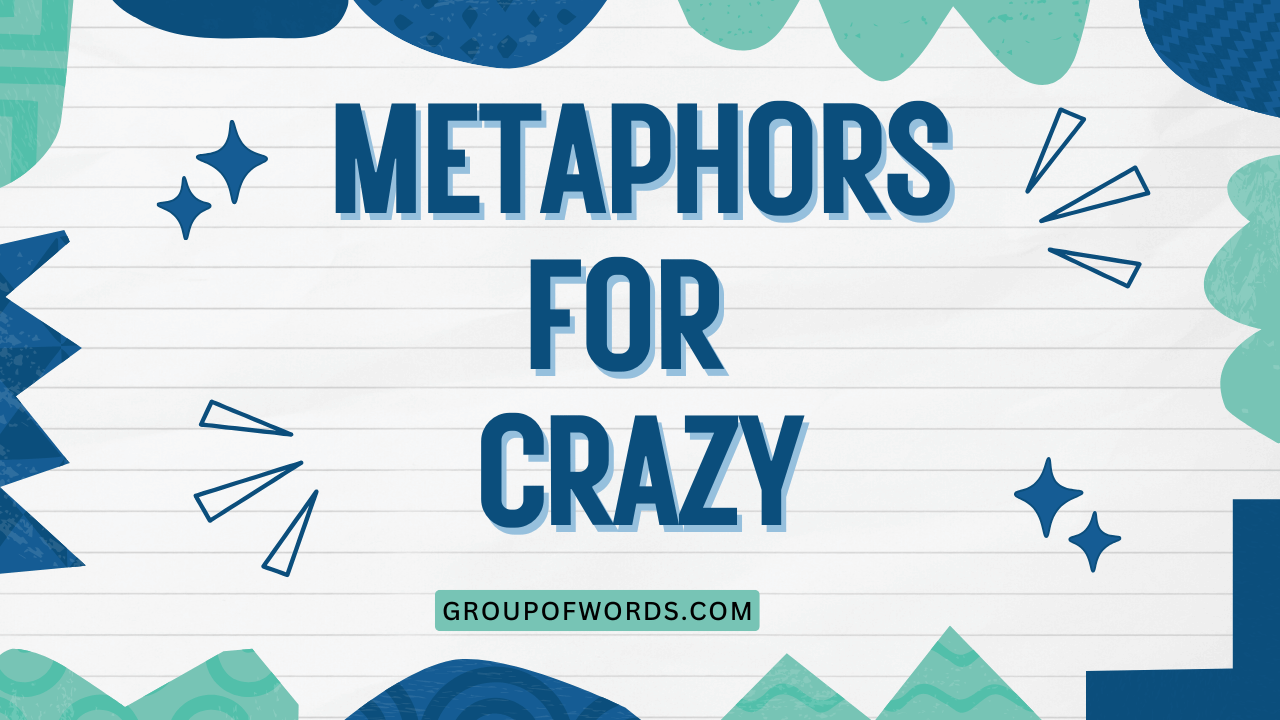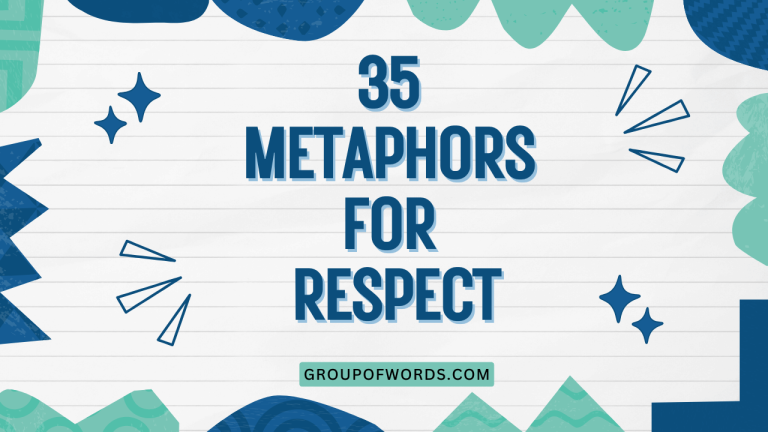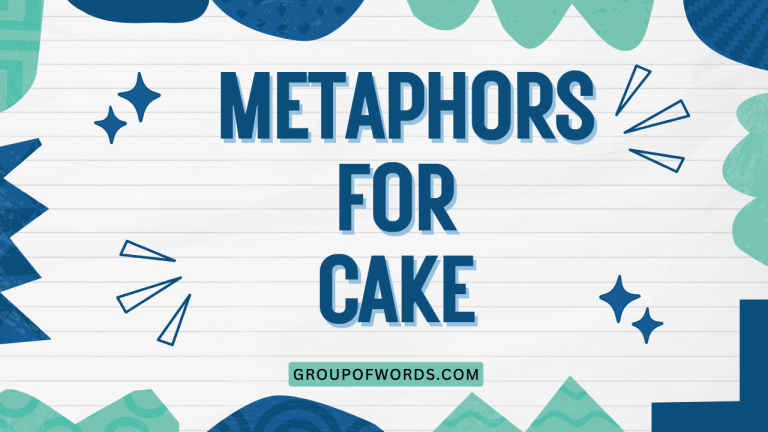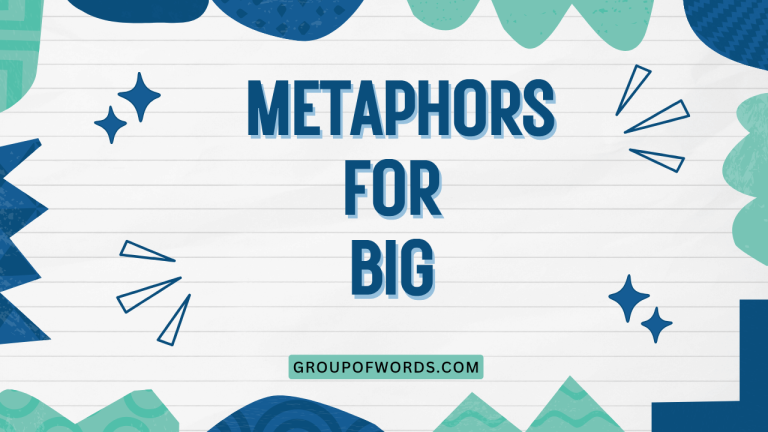Metaphors for Crazy: A Comprehensive Guide
Understanding how we use metaphors to describe states of mind, particularly “craziness,” is crucial for mastering nuanced English. These metaphors offer vivid and often humorous ways to express something that’s difficult to define directly.
This article delves into the rich landscape of metaphors for “crazy,” exploring their meanings, origins, and proper usage. Whether you’re an English language learner or a native speaker looking to expand your vocabulary, this guide will provide you with a deeper appreciation for the creative power of figurative language.
By mastering these metaphors, you’ll be able to communicate more effectively and understand the subtle shades of meaning in everyday conversations and literature.
Table of Contents
- Introduction
- Definition of Metaphors for Crazy
- Structural Breakdown
- Types and Categories of Metaphors for Crazy
- Examples of Metaphors for Crazy
- Usage Rules
- Common Mistakes
- Practice Exercises
- Advanced Topics
- FAQ
- Conclusion
Definition of Metaphors for Crazy
A metaphor is a figure of speech that directly compares two unrelated things, suggesting a resemblance between them. When we use metaphors to describe someone as “crazy,” we are not literally saying they are insane.
Instead, we are using the qualities associated with the metaphorical term to illustrate their behavior, thought patterns, or emotional state. These metaphors serve as a shorthand, allowing us to convey complex ideas and feelings in a concise and often humorous way.
The effectiveness of a metaphor depends on the shared understanding of the qualities attributed to the metaphorical term.
Metaphors for “crazy” can be classified as descriptive metaphors, which aim to paint a vivid picture of the person’s mental state. They function primarily as adjectives or adjectival phrases modifying the person being described. The context in which these metaphors are used is crucial. A metaphor that is acceptable in informal conversation might be inappropriate in a formal setting or when discussing mental health issues with professionals. The choice of metaphor often depends on the speaker’s intent, the audience, and the overall tone of the conversation.
Structural Breakdown
Metaphors for “crazy” typically follow a simple structure: [Subject] is [Metaphorical Term] or [Subject] is like [Metaphorical Term]. The subject is the person or thing being described as crazy. The metaphorical term is the word or phrase that carries the figurative meaning. The linking verb “is” or the comparative phrase “is like” establishes the connection between the subject and the metaphorical term. Sometimes, the structure can be more implicit, with the metaphorical term used as an adjective (e.g., “He’s a loon”).
The power of these metaphors lies in the associations people have with the metaphorical term. For example, saying someone is “bananas” implies that their behavior is unpredictable, silly, and perhaps a bit chaotic, drawing on the common association of bananas with monkeys and, by extension, with playful, unrestrained behavior. Understanding the connotations of the metaphorical term is essential for interpreting the intended meaning of the metaphor. Consider the sentence, “She’s off her rocker.” Here, the rocker (rocking chair) symbolizes stability and normalcy. To be “off” it suggests a deviation from that norm, implying instability or mental imbalance.
Types and Categories of Metaphors for Crazy
Metaphors for “crazy” can be grouped into several categories based on the type of imagery they evoke. These categories help to understand the underlying meaning and connotations of each metaphor.
Animalistic Metaphors
These metaphors compare a person’s behavior to that of an animal, often implying wildness, unpredictability, or lack of control. They leverage the common associations people have with various animals to convey the nature of the “craziness.” For instance, describing someone as “batty” draws on the erratic flight patterns and nocturnal habits of bats.
Mechanical Metaphors
Mechanical metaphors suggest that a person’s mind or behavior is malfunctioning, like a machine that is broken or out of order. These metaphors often imply a loss of rational thought or a disruption in normal functioning.
For example, saying someone has “a screw loose” suggests that something is not quite right in their mental mechanism.
Temperature-Related Metaphors
Temperature metaphors use the concept of heat to describe a person’s emotional state, often implying that they are overly excited, agitated, or irrational. These metaphors draw on the association of heat with passion, intensity, and lack of control.
Describing someone as “hot under the collar” suggests they are angry or agitated to the point of losing their composure.
Loss of Control Metaphors
These metaphors indicate a lack of self-control or an inability to think rationally. They often suggest that the person is being driven by forces beyond their conscious awareness.
The phrase “out of their mind” directly implies that the person’s thoughts and actions are no longer governed by reason.
Food-Related Metaphors
Food-related metaphors use culinary terms to describe a person’s behavior. These can imply that someone is overripe or spoiled, suggesting a decay of mental faculty.
“Half-baked” suggests that their ideas or plans are incomplete or poorly thought out.
Cosmic and Supernatural Metaphors
Cosmic and supernatural metaphors invoke imagery from outer space or the realm of the supernatural to describe states of extreme craziness or irrationality. These metaphors often suggest that the person’s behavior is beyond the bounds of normal human experience.
For example, saying someone is “spaced out” implies they are disconnected from reality, as if lost in outer space.
Architectural Metaphors
Architectural metaphors compare a person’s mental state to a building or structure, often implying instability or decay. These metaphors draw on the association of architecture with stability, order, and reason.
Describing someone as having “bats in the belfry” suggests that their mind is filled with strange or irrational thoughts, likening the belfry (the bell tower of a church) to a space where bats, symbols of the erratic, reside.
Examples of Metaphors for Crazy
The following tables provide examples of metaphors for “crazy,” categorized by type, along with explanations of their meanings and nuances.
Table 1: Animalistic Metaphors
This table showcases various animalistic metaphors used to describe someone as crazy, highlighting the connection between animal behavior and perceived mental instability.
| Metaphor | Meaning | Example Sentence |
|---|---|---|
| Batty | Eccentric, slightly crazy | My aunt is a bit batty, but she’s always entertaining. |
| Loony | Crazy or foolish | He’s been acting loony ever since he lost his job. |
| Mad as a hatter | Completely insane | After years of isolation, he became as mad as a hatter. |
| Squirrelly | Nervous or eccentric | He gets a little squirrelly when he has to speak in public. |
| Buggy | Slightly crazy | She’s a little buggy, but she has a good heart. |
| Cagey | Secretive and suspicious, possibly paranoid | He became cagey after the incident, refusing to talk about it. |
| Wild | Uncontrolled, reckless | The party got wild as the night went on. |
| Go ape | To become very angry or excited | He went ape when he found out his car had been vandalized. |
| Like a chicken with its head cut off | Acting in a frantic and disorganized manner | She was running around like a chicken with its head cut off, trying to find her keys. |
| Mad dog | Fierce, uncontrollable | He was a mad dog, determined to win at all costs. |
| Crazy like a fox | Seemingly foolish but actually very clever | Don’t underestimate him; he’s crazy like a fox. |
| Driven mad | To be made crazy by someone or something | The constant noise drove her mad. |
| As daft as a brush | Very silly or foolish | He’s as daft as a brush, but we love him anyway. |
| Bonkers | Crazy, mad | The idea is completely bonkers, but it might just work. |
| Off one’s trolley | Crazy, insane | He’s completely off his trolley if he thinks that’s a good idea. |
| Round the bend | Crazy, insane | She’s gone completely round the bend after the breakup. |
| Out to lunch | Not paying attention, crazy | He’s totally out to lunch if he thinks he can get away with that. |
| A fruitcake | An eccentric or crazy person | She’s a bit of a fruitcake, but she’s harmless. |
| A basket case | Someone who is emotionally or mentally unstable | After the accident, he was a complete basket case. |
| Off the deep end | Gone crazy, lost control | He went off the deep end when he heard the news. |
| A nutcase | A crazy person | He’s a complete nutcase, but he’s also brilliant. |
| A wacko | A crazy or eccentric person | She’s a bit of a wacko, but she’s a lot of fun. |
| Mad as a March hare | Completely insane | He’s as mad as a March hare, talking to himself in the street. |
| Has bats in the belfry | Crazy, eccentric | She has bats in the belfry, always coming up with strange ideas. |
| Mad as a wet hen | Extremely angry or crazy | She was mad as a wet hen when she found out what he’d done. |
| Barking mad | Completely insane | He’s barking mad if he thinks he can climb that mountain in this weather. |
Table 2: Mechanical Metaphors
This table lists mechanical metaphors, illustrating the concept of mental malfunction or disorder.
| Metaphor | Meaning | Example Sentence |
|---|---|---|
| A screw loose | Slightly crazy or eccentric | I think he has a screw loose; he wears a hat indoors. |
| Not firing on all cylinders | Not functioning at full capacity | She’s not firing on all cylinders today; she seems distracted. |
| Out of order | Not functioning properly, mentally unstable | His mind seems to be completely out of order. |
| Short-circuited | Experiencing a mental breakdown | Her brain seemed to short-circuit under the pressure. |
| Wires crossed | Confused or misunderstanding each other | We must have our wires crossed; I thought we were meeting tomorrow. |
| Lost a cog | Slightly crazy or foolish | He’s lost a cog somewhere; he’s acting very strangely. |
| Off the rails | Out of control, behaving erratically | His life went completely off the rails after his divorce. |
| Broken record | Repeating the same thing over and over | He’s like a broken record, always complaining about the same thing. |
| Clockwork Orange | Seemingly normal but deeply disturbed | He appears calm, but inside he’s like a clockwork orange. |
| Run out of steam | Lost energy or enthusiasm | She’s run out of steam after working on the project for so long. |
| Blown a fuse | Lost one’s temper | He blew a fuse when he saw the damage to his car. |
| Need rewiring | Mentally or emotionally needing to be fixed | His brain needs rewiring after that traumatic experience. |
| Gone haywire | Out of control, malfunctioning | The computer system went haywire and crashed. |
| A glitch in the system | A minor problem or error | There was a glitch in the system that caused the delay. |
| On the blink | Not working properly | The television’s on the blink again. |
| A loose cannon | Unpredictable and dangerous | He’s a loose cannon and could say anything. |
| Needs an oil change | Needs rest or rejuvenation | He needs an oil change after working so hard. |
| Engine is sputtering | Struggling to function | His mind is sputtering; he can’t focus. |
| A cog in the machine | An insignificant part of a larger system | He felt like just a cog in the machine, with no real purpose. |
| Running on empty | Continuing to function despite being exhausted | She’s running on empty after working all night. |
| Needs a tune-up | Needs improvement or adjustment | His performance needs a tune-up if he wants to succeed. |
| Gears grinding | Having difficulty functioning smoothly | His gears are grinding; he’s struggling to understand. |
| Missing a gear | Not functioning properly | He’s missing a gear; he keeps making silly mistakes. |
| Off-kilter | Not balanced or stable | His behavior is a bit off-kilter lately. |
| Out of sync | Not coordinated or in harmony | Their ideas are out of sync, causing conflict. |
| Running in circles | Engaged in pointless activity | He’s running in circles, not making any progress. |
Table 3: Temperature-Related Metaphors
This table explores metaphors related to temperature, which often describe a volatile or irrational state of mind.
| Metaphor | Meaning | Example Sentence |
|---|---|---|
| Hot under the collar | Angry or agitated | He got hot under the collar when he heard the news. |
| Steamed up | Very angry or excited | She got steamed up when they questioned her integrity. |
| Flipped his lid | Lost his temper, became very angry | He flipped his lid when he saw the mess they had made. |
| Boiling point | The point at which someone loses their temper | He’s reaching his boiling point; he can’t take much more. |
| Hotheaded | Easily angered | He’s a hotheaded young man who needs to learn to control his temper. |
| Head is spinning | Confused or overwhelmed | My head is spinning after that lecture. |
| Seeing red | Extremely angry | He was seeing red when he found out he’d been cheated. |
| Burned out | Exhausted and unable to cope | She’s completely burned out after working such long hours. |
| Simmering | Suppressing anger or resentment | She was simmering with anger, trying to keep it under control. |
| Frozen with fear | Paralyzed by fear | He was frozen with fear when he saw the bear. |
| Cold as ice | Emotionless, uncaring | Her heart is as cold as ice. |
| On fire | Very excited or enthusiastic | He’s on fire with his new project. |
| Heated argument | A passionate and angry discussion | They had a heated argument about politics. |
| Scalding | Extremely hot, both literally and figuratively | He gave her a scalding look. |
| Brain is fried | Mentally exhausted | My brain is fried after studying all day. |
| Under pressure | Experiencing stress and tension | He’s under a lot of pressure at work. |
| Feeling the heat | Experiencing pressure or criticism | He’s feeling the heat from the media. |
| Inflamed | Aroused to passion or anger | His comments inflamed the crowd. |
| White-hot rage | Intense and uncontrollable anger | He was consumed by white-hot rage. |
| Blow off steam | Release anger or tension | He went for a run to blow off steam. |
| Keep a cool head | Stay calm under pressure | He managed to keep a cool head in the crisis. |
| Reach a fever pitch | Reach a state of intense excitement | The excitement reached a fever pitch as the game went into overtime. |
| Ice-cold stare | A chilling, emotionless look | She gave him an ice-cold stare. |
| Hot air | Empty talk or exaggeration | His promises are just hot air. |
| Frozen in time | Stuck in the past, unable to move forward | She’s frozen in time, unable to move on from her past. |
| Burning with ambition | Having a strong desire for success | He’s burning with ambition to become a CEO. |
Table 4: Loss of Control Metaphors
This table presents examples of metaphors indicating a loss of self-control and rational thought.
| Metaphor | Meaning | Example Sentence |
|---|---|---|
| Out of their mind | Insane, not thinking rationally | He must be out of his mind to try that. |
| Lost it | Lost control of emotions or behavior | She completely lost it when she heard the news. |
| Gone to pieces | Become emotionally ভেঙ্গে | She went to pieces after the breakup. |
| Off the rails | Out of control, behaving erratically | His life went off the rails after he lost his job. |
| Lost her marbles | Become senile or crazy | She’s lost her marbles; she can’t remember anything. |
| Unraveling | Falling apart emotionally or mentally | She felt like she was unraveling under the pressure. |
| Losing grip | Losing control of a situation or oneself | He’s losing his grip on reality. |
| Over the edge | Gone crazy or irrational | He went over the edge after the accident. |
| Flying off the handle | Losing one’s temper | He flew off the handle when he saw the mess. |
| Out of touch | Not aware of what’s happening around them | He’s out of touch with reality. |
| Lost in space | Confused or disoriented | He seems lost in space these days. |
| Disconnected | Feeling isolated or detached | She feels disconnected from the world. |
| Spaced out | Dazed or unaware | He was completely spaced out during the meeting. |
| Drifting | Lacking direction or purpose | He’s been drifting through life since he graduated. |
| Unmoored | Feeling lost and without direction | She felt unmoored after her parents died. |
| Adrift | Without direction or purpose | He’s been adrift since he left the army. |
| Unstable | Emotionally or mentally insecure | She’s emotionally unstable and needs help. |
| Volatile | Liable to change rapidly and unpredictably | He has a volatile temper. |
| Capricious | Given to sudden and unaccountable changes of mood or behavior | She’s capricious and changes her mind constantly. |
| Erratic | Unpredictable and inconsistent | His behavior has been erratic lately. |
| Unpredictable | Not able to be foreseen or predicted | He’s unpredictable, you never know what he’s going to do. |
| Uncontrollable | Not able to be controlled | His anger is uncontrollable. |
| Rambling | Talking at length in a confused or inconsequential way | He was rambling on about his conspiracy theories. |
| Incoherent | Expressing oneself in an unclear way | He was incoherent after the accident. |
| Delirious | In an acutely disturbed state of mind | He was delirious with fever. |
| Hysterical | Exhibiting wildly uncontrolled emotion | She became hysterical when she heard the news. |
Table 5: Food-Related Metaphors
Food-related metaphors used to describe someone as crazy are presented in this table, often implying incompleteness or decay.
| Metaphor | Meaning | Example Sentence |
|---|---|---|
| Half-baked | Incompletely thought out, foolish | That’s a half-baked idea; it will never work. |
| A fruitcake | An eccentric or crazy person | She’s a bit of a fruitcake, but she’s harmless. |
| Nuts | Crazy, insane | He’s nuts if he thinks he can get away with that. |
| Bananas | Crazy, insane | That idea is completely bananas. |
| Gone to seed | Deteriorated in appearance or condition | She’s gone to seed since she retired. |
| Sour grapes | Pretending to dislike something because one cannot have it | His criticism is just sour grapes because he didn’t get the job. |
| Rotten to the core | Completely corrupt or evil | The company was rotten to the core. |
| Full of baloney | Talking nonsense, lying | He’s full of baloney; don’t believe anything he says. |
| Spilled the beans | Revealed a secret | She spilled the beans about the surprise party. |
| A tough cookie | A strong and resilient person | She’s a tough cookie; she can handle anything. |
| Hard to swallow | Difficult to believe or accept | The truth was hard to swallow. |
| Chewing the fat | Chatting informally | They were just chewing the fat over coffee. |
| A piece of cake | Very easy | The exam was a piece of cake. |
| Cream of the crop | The best of the best | She’s the cream of the crop in her field. |
| In a pickle | In a difficult situation | He’s in a pickle because he lost his passport. |
| A bad egg | A dishonest or unreliable person | He’s a bad egg; don’t trust him. |
| Go pear-shaped | Go wrong, fail | The project went pear-shaped when the funding was cut. |
| Out to pasture | Retired from active service | He’s out to pasture after a long career. |
| A plum job | A desirable job | That’s a plum job that everyone wants. |
| Take with a grain of salt | Not to be taken too seriously | Take his advice with a grain of salt. |
| Sugarcoating | Making something seem more pleasant than it is | He was sugarcoating the bad news. |
| Cooked up | Invented or fabricated | He cooked up a story to explain his absence. |
| Full of hot air | Talking nonsense | He’s full of hot air; don’t listen to him. |
| Get a taste of | Experience something for the first time | He got a taste of success and wanted more. |
| Eat humble pie | Admit one’s mistake and apologize | He had to eat humble pie after being proven wrong. |
| A recipe for disaster | A situation likely to end badly | Their plan is a recipe for disaster. |
Usage Rules
When using metaphors for “crazy,” it’s important to consider the context, audience, and potential impact of your words. While these metaphors can be colorful and expressive, they can also be insensitive or offensive, especially when discussing mental health issues.
Avoid using metaphors that trivialize or stigmatize mental illness. Be mindful of the connotations of the metaphorical term and choose metaphors that accurately reflect the intended meaning without causing harm.
In formal settings or when discussing serious topics, it’s generally best to avoid using metaphors for “crazy” altogether. Instead, opt for more direct and respectful language.
The level of formality of the situation should also guide your choice. In casual conversations with friends, using a metaphor like “He’s gone bananas” might be perfectly acceptable.
However, in a professional setting, such language would be inappropriate. Additionally, cultural differences can influence the interpretation of these metaphors.
What is considered humorous or harmless in one culture might be offensive in another. Therefore, it’s crucial to be aware of your audience and adapt your language accordingly.
When in doubt, it’s always better to err on the side of caution and choose more neutral and respectful language.
Common Mistakes
One common mistake is using metaphors for “crazy” without fully understanding their meaning or connotations. This can lead to miscommunication or offense.
Another common mistake is using these metaphors inappropriately in formal settings or when discussing sensitive topics. It’s also important to avoid mixing metaphors, which can create confusing or nonsensical statements.
For example, saying “He’s a screw loose and running on empty” combines two different metaphors in a way that doesn’t quite make sense.
Consider the following examples:
Incorrect: “The CEO’s speech was completely bananas and firing on all cylinders.” (Mixing metaphors)
Correct: “The CEO’s speech was completely bananas.”
Correct: “The CEO’s speech was firing on all cylinders.”
Incorrect: “He’s so mad as a hatter, he should be in charge of the project.” (Inappropriate use in a professional context)
Correct: “He has a lot of creative ideas, which could be valuable for the project.”
Practice Exercises
Exercise 1: Identify the Meaning
Match the metaphor with its correct meaning.
| Metaphor | Meaning |
|---|---|
| 1. Off the deep end | A. Slightly crazy or eccentric |
| 2. A screw loose | B. Extremely angry |
| 3. Seeing red | C. Out of control, behaving erratically |
| 4. Gone bananas | D. Completely crazy or irrational |
| 5. Off the rails | E. Insane, wildly excited |
Answers: 1-D, 2-A, 3-B, 4-E, 5-C
Exercise 2: Fill in the Blank
Complete the sentences with an appropriate metaphor for “crazy.”
| Sentence | Possible Answer |
|---|---|
| 1. After working non-stop for 48 hours, I felt like my brain was __________. | fried |
| 2. He’s completely __________ if he thinks he can get away with cheating on the exam. | nuts |
| 3. She __________ when she found out her car had been stolen. | lost it |
| 4. Ever since the accident, he’s been acting a little __________. | squirrelly |
| 5. The project __________ when the funding was cut. | went pear-shaped |
| 6. She is __________ and changes her mind constantly. | capricious |
| 7. He gave her an __________ stare. | ice-cold |
| 8. He is __________ if he thinks he can climb that mountain in this weather. | barking mad |
| 9. His promises are just __________. | hot air |
| 10. He is __________ with ambition to become a CEO. | burning |
Exercise 3: Rewrite the Sentences
Rewrite the following sentences using a metaphor for “crazy.”
| Original Sentence | Rewritten Sentence |
|---|---|
| 1. He | He is out of his mind. |
| 2. She became very angry. | She flipped her lid. |
| 3. The plan failed. | The plan went pear-shaped. |
| 4. He is acting foolishly. | He’s got a screw loose. |
| 5. She is a bit eccentric. | She has bats in the belfry. |
Advanced Topics
Delving deeper into the use of metaphors for “crazy” involves examining their cultural and historical contexts. Certain metaphors may have specific origins or associations that add layers of meaning.
For example, the phrase “mad as a hatter” is believed to originate from the use of mercury in the hat-making process, which caused neurological damage in hatters. Understanding these historical roots can enrich your appreciation of the metaphor’s significance.
Another advanced topic is the use of metaphors for “crazy” in literature and art. Authors and artists often employ these metaphors to create vivid character portrayals, explore themes of mental illness, or challenge societal norms.
Analyzing how these metaphors are used in creative works can provide insights into the power of figurative language and its ability to shape our understanding of complex concepts. Furthermore, exploring the psychological impact of these metaphors can shed light on how they influence our perceptions of mental health and those who experience mental illness.
FAQ
Are metaphors for “crazy” always offensive?
Not necessarily. The offensiveness of a metaphor depends on the context, audience, and intent of the speaker.
However, it’s generally best to avoid using these metaphors when discussing mental health issues or in formal settings.
What is the origin of the phrase “mad as a hatter”?
The phrase is believed to originate from the use of mercury in the hat-making process, which caused neurological damage in hatters, leading to erratic behavior.
How can I use metaphors for “crazy” appropriately?
Consider the context, audience, and potential impact of your words. Avoid using metaphors that trivialize or stigmatize mental illness.
Be mindful of the connotations of the metaphorical term and choose metaphors that accurately reflect the intended meaning without causing harm.
What are some alternatives to using metaphors for “crazy”?
Use more direct and respectful language. Describe the person’s behavior or emotional state in a clear and objective way.
Avoid using judgmental or stigmatizing language.
Can metaphors for “crazy” be used humorously?
Yes, in certain contexts, these metaphors can be used humorously. However, it’s important to be mindful of your audience and avoid causing offense.
Conclusion
Metaphors for “crazy” offer a rich and varied way to express complex ideas and emotions. By understanding the different types of metaphors, their meanings, and their proper usage, you can enhance your communication skills and gain a deeper appreciation for the power of figurative language.
However, it’s crucial to use these metaphors responsibly and avoid causing harm or offense. When in doubt, it’s always best to err on the side of caution and choose more direct and respectful language.
Mastering these metaphors allows for more colorful and nuanced expression, but always with consideration for the context and audience.






